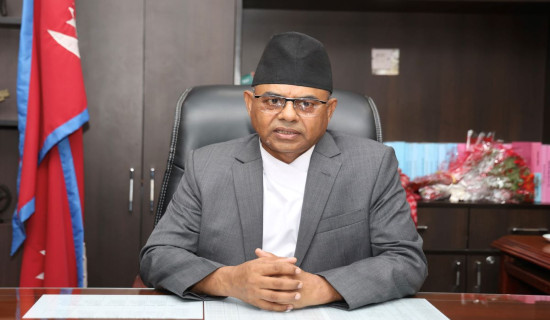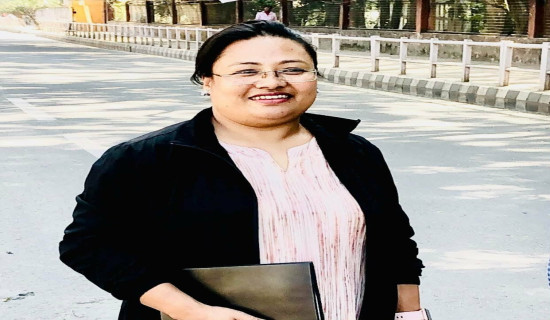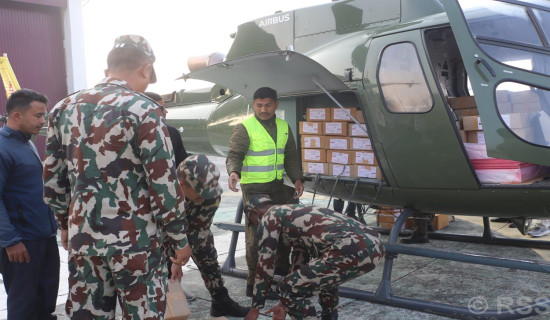- Thursday, 26 February 2026
Grasp Shifting Trends In Party Politics
Nepali political parties are shifting to a multi-faction system where each sitting top leader is facing challenges from within by aspiring leaders. Political dynamics, the art of social transformation and basic party functions, including government’s equal concern for all people is cramped. As political fixers, they have altered the fundamental assumptions, goals and ideologies when they were created. One can unveil new spectacles in Nepali party politics. First, the desertion of old class-based worldview and incubation of a new pattern of distribution of power, wealth and position in society through inclusion of identities, proportional representation, affirmative action, quota, social justice and institutionalised and constitutionalised recognition.
When the constitution as a document of national unity is contested party politics becomes a game without rules. Now the organic basis of solidarity based on biology, not ideology, is escalating the ferocity of identity groups. Nepali parties have amplified civic participation of people, widened the scope of social contract with more rights and enlarged the constitutional and social base of politics. This amounts to a major shift in political socialisation, mobilisation, interest aggregation and articulation of all groups of Nepali society and revving up leadership strife. It is adding agility to democratic life.
Interest groups
The second is the growth of multi-functional interest groups in Nepali political parties. The business, NGOs, professional bodies, civil society and ethnic and gender strata have permeated them with a new scale of priorities aimed to grease the wheel of progress. As the backup bodies of parties they are more interested in collective bargaining within the parties and the government for the fulfillment of their partial interests, not the public interests. The primacy of interests over the basic values of democracy, human rights and social justice shows that struggle in Nepali parties is premised on which group controls key positions to satisfy the interest of its loyal circle of clients.
It is vital to shape leadership in the governing institutions but in no way atone for the deficits of social, gender and intergenerational justice. Counter leaders are shifting their political culture from habit-driven mode to cognitive analysis adding greater heft to critical, innovative and educational character of cadres and people for change which top leaders impulsively loathe. Third, party struggle in Nepal both inter- and intra-party is based on who determines politics, power, leadership and resources, not on developing civic culture of tolerance of diversity of opinion, beliefs and preferences for political modernisation, democratisation and dynamics of party system that cultivates the deserving leaders.
They are helpful to keep democratic spirit in the parties and prevent their degeneration into plutocracy or even leader-oriented partiocracy that dominates all spheres of national life and infects partisanisation of non-political arena. Peter Turchin says, “Plutocrats can use their wealth to buy mass media, to fund think tanks and hand several rewards to those social influencers who promote their messages.” The rise of these factors touches the poignant tone of top leaders. The mainstream parties – Nepali Congress, CPN-UML and CPN Maoist Centre, interpenetrating each other’s space, have realised the need to reconnect with the people with new deliberation programmes on policies, ideologies, organisation and leadership to crawl ahead.
It is still a top-down one while the new shift demands a bottom up loop. Sovereign Nepalis now question the patronising attitude of their leadership. To earn public confidence, political leaders need to acknowledge first their own weak performance in the public policy domain and even apologise for the financial malpractices and malaises they bred to weaken public institutions. Fourth, Nepali political parties are shifting from group-based entities to general mass, coordinating elites and sub-elites and accumulating money, even stealing the public resources to build organisation, communication networks, programmess, campaign financing and vote-buying. They dole out state resources to social projects in order to consolidate influence in their electoral constituencies and propel a rightward drift, often fostered by their belief on the middle path set by the constitution.
The jarring switch of the state into patronage character has enabled the transactional leaders to win elections repeatedly and stifle the growth of transformational leaders with clear vision, policies and commitments but also upholding personal integrity as is shown by some mayors. Huge flow of money and materials to uncritical cadres and potential voters indicate the decline of political volunteerism. Alternatively new parties are mobilising frustrated youths, social media and anti-incumbent tirade to garner support for them. The rise of populism and diminishing importance of catch-all types of party manifestos, lacking clear focus, exhibit this. The shift of politics from solidarity to networks is derailing them from their goals, eventual erosion of influence, weathering and finally merging with other parties like business conglomerates.
Power bloc politics seen in recent elections and coalition governments amply show that Nepali parties are reeling from a lack of efficacy to resolve myriad of national problems, control declining voter turnout, cut the scale of popular apathy and manage the waning density of party membership. One reason is electoral party competition is stained by unequal campaign funding by businessmen, special interest groups and even blessed by some donors through party-affiliated NGOs who are responsible to fracture parties through inter-party caucus groups of various identities whispering in chorus. Only civic renewal in Nepal can manage the lure of certain groups to indulge in extra-party, extra-legislature and extra-polity pull and put off the decay of political order.
Fifth, the consensual acceptance of neo-liberal economy and post-modern tendency, as late ideologies of capitalism have diluted the social integration potential of parties with the constitutional imperative of the welfare state and cut the spell of uneasy peace kept with the signing of peace accord. Durable peace in Nepal does not emerge so long as political parties keep a winner-takes-all mentality deferring transitional justice and nurturing an area of privilege, profit, impunity and paradise for the political class, not public duty and mutual cooperation to uplift Nepalis. Neo-liberalism has produced a cult of self-referential, flip-flopper leadership less attuned to the production of public good than forging collusion with comprador classes. It has turned politics into an elite game, not the welfare of poor Nepalis so that they can guarantee the prospect for them and their children in the nation.
The rise of cultural nationalism is mainly attributed to the uneven condition of living under necessities, comfortable amenities and fully luxurious life for different kinds of classes depending on their access to power. The constitution conceives of an egalitarian society, not hierarchy of life while dreary economic prospects defy this. Its effects are procreating de-alignment of voters, surge of new parties driven by information, swell of independent politicians and birth of sectarian parties. Political stasis is provoking the fury of aspiring leaders in the parties and outside and stoking a spike in their instability. Instability is caused by the over-production of leaders, political structures and forces relative to the underproduction of the economy to fund them.
Sixth, the modes of political life of mainstream political parties are interdependent and the nature of syndicate indicate the nourishment of overlapping character, related to each other internally and animated by the rationalisation of common lust for power-sharing regardless of shifting electoral outcome. Inter-party ties are glued not by informed conversation about the national issues but exchange and transactional relationships. Nepali politicians have not developed the concept of leadership thinking about uplifting the nation and people or even statesmanship to plan for political development forward in generational terms.
Fluidity in party politics
The growth of myriad cause groups such as victims of loan shark, cooperatives, banks and manpower companies, onset of cultural and citizen protection groups, identity-crazy alliances and their continuous social struggles for justice have generated fluidity in party politics. It has evoked the general weariness of ordinary people. The ethical behaviour of leaders can overcome this situation if they uphold democratic ideals, not only the immoral pursuit of self-interest and self-aggrandizement. Only civic renewal in Nepal can provide good motives and reason for the democratic concept of party politics beyond the temptation of leaders to satisfy personal greed, passion and ambition devoid of public purpose.
This, however, requires non-commercialisation of security, education, health, justice system, media, nature and culture. They are public good to be shared equally by all Nepalis. Their commercialisation will have a deeper impact on party politics as it creates a gap between political and constitutional ideals and international obligations and their inverted habits and practices. Otherwise, it will resemble classical Nepali aphorism: “A spider is eaten by its own offspring.” Before the light of reason starts to dim by frustration and agitation of people, national leaders must begin to muster courage and wisdom to reform their political culture thus making political parties adaptable to the learning of changing aspirations of Nepali electorates and aptly respond to them.
(Former Reader at the Department of Political Science, TU, Dahal writes on political and social issues.)
















